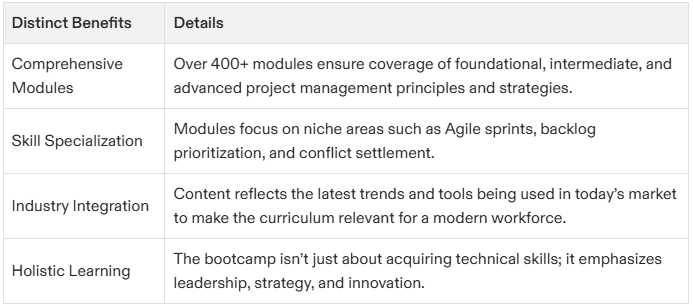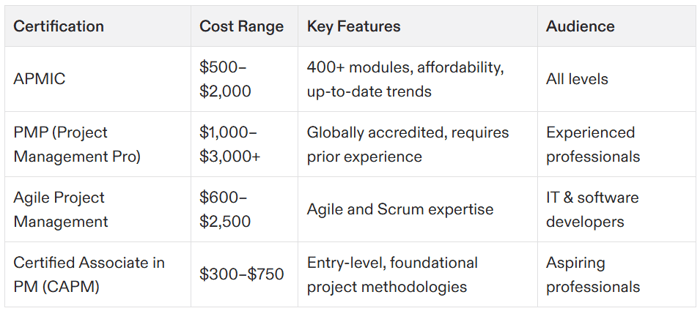Table of Contents
- Why Pursue a Project Management Certification?
- Common Requirements for Project Management Certification
- Detailed Explanation of Requirements
- Advanced-Level vs. Beginner Certifications
- Benefits of Meeting Certification Requirements
- The Role of APMIC in Certification
- How to Prepare for Certification Requirements
- Less Commonly Known Facts About Project Management Certification
- Conclusion
- FAQs
Imagine you're at a party, and someone asks, "What do you do?" You proudly say, "I'm a project manager!" But then comes the follow-up question: "Are you certified?" Suddenly, your confidence wavers. Don't let that happen! In today's fast-paced world, having a project management certification is like wearing a superhero cape—it sets you apart and gives you the power to tackle any project with confidence. Let's dive into the requirements for project management certification and explore how you can become a certified project management rockstar!
If you're unsure which certification to pursue, check out this Top Project Management Certifications to explore the best options available in 2025.
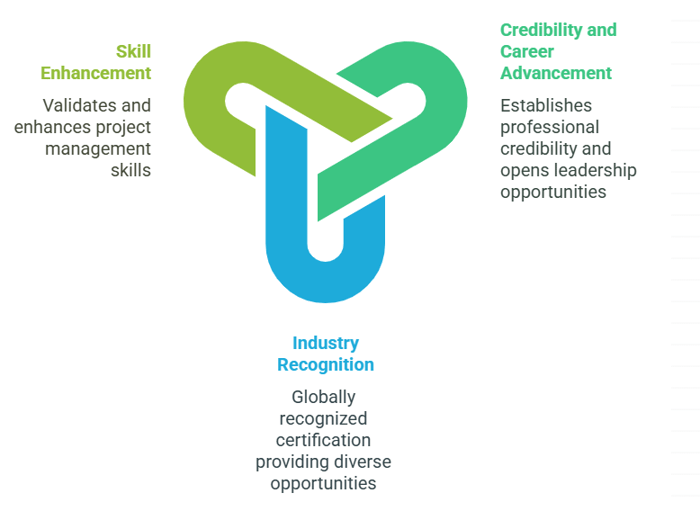
Why Pursue a Project Management Certification?
In the competitive landscape of modern business, certifications are more than just a piece of paper; they're a badge of honor that signifies your expertise and commitment to excellence. Here are a few compelling reasons to pursue a project management certification:
Credibility and Career Advancement: Certifications establish your credibility as a professional and open doors to leadership roles, enhancing career mobility and earning potential. For instance, certified project managers often enjoy more responsibility, better job security, and international opportunities.
Industry Recognition: Certifications are recognized globally, providing opportunities across diverse industries like IT, construction, and healthcare. The PMP certification, for example, is one of the most widely recognized and respected credentials in the field.
Skill Enhancement: They validate your skills in managing scope, deadlines, risks, and budgets, leading to better job security and international opportunities. By mastering these skills, you can tackle complex projects with ease and confidence.
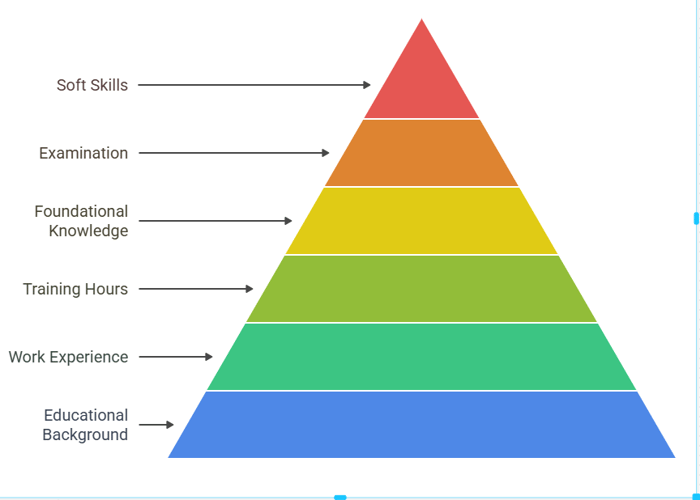
Common Requirements for Project Management Certification
Understanding the prerequisites for project management certification is the first step on your journey to becoming a certified professional. These requirements vary by program and certification level, but here are the general guidelines:
1. Educational Background
High School Diploma or Equivalent: Often sufficient for entry-level certifications like CAPM. This level of education is ideal for those just starting out in project management or looking to transition into the field. CAPM is a foundational certification that doesn't require prior project management experience, making it accessible to beginners.
Bachelor’s Degree or Higher: Required for advanced certifications like PMP. A bachelor's degree is typically necessary for certifications that demand more experience and expertise, such as the PMP. This degree can be in any field, but having a background in business, management, or a related field can be beneficial.
Field-Specific Education: For niche certifications, such as those in construction or IT. Some certifications are tailored to specific industries, requiring specialized knowledge or education. For example, certifications in IT project management might require courses or experience in software development or network management.
2. Work Experience
Hands-on Experience: Leading certifications require proven project management expertise. For example, PMP mandates 4,500 hours of experience for degree holders and 7,500 hours for those without a degree. This experience must be accrued within the last eight years and involves leading and directing projects. The experience requirement ensures that candidates have practical knowledge of managing projects from start to finish.
📌 SSGI Certification – Designed for professionals interested in process improvement and Lean Six Sigma methodologies. Learn more in the Ultimate Guide to SSGI Project Management Certification.
3. Foundational Knowledge
Introductory Courses: Beginners can fulfill prerequisites through short courses or foundational certifications like CAPM. These courses cover basic project management principles, such as project planning, execution, and monitoring. They are essential for building a solid foundation in project management and preparing for more advanced certifications.
4. Training Hours or Courses
Mandatory Training: Many programs require completing a specified number of training hours. For instance, PMP candidates must complete at least 35 hours of project management education. This education can be formal courses, workshops, or training sessions that cover project management topics. The training hours ensure that candidates have a comprehensive understanding of project management methodologies and tools.
5. Examination and Assessment
Rigorous Exams: These evaluate understanding of core project management concepts and tools. The exams are designed to test a candidate's ability to apply knowledge in real-world scenarios. For example, the PMP exam consists of 180 questions that cover various aspects of project management, including integration management, scope management, and stakeholder management.
6. Soft Skills Requirements
While not explicit requirements, developing soft skills like communication, negotiation, and leadership enhances employability and real-world application. Soft skills are crucial for effective project management as they help in team management, stakeholder engagement, and conflict resolution. Although certifications focus on technical skills, having strong soft skills can significantly improve a project manager's ability to lead projects successfully.
Detailed Explanation of Requirements
Educational Background
The educational background required for project management certifications varies significantly depending on the level of certification. For entry-level certifications like CAPM, a high school diploma or equivalent is sufficient. This makes CAPM accessible to individuals who are new to project management or looking to transition into the field without extensive experience.
For advanced certifications like PMP, a bachelor’s degree or higher is typically required. This degree can be in any field, but having a background in business, management, or a related field can be beneficial. The PMP certification is one of the most recognized and respected credentials in the field, and it demands a higher level of educational attainment.
Field-specific education is necessary for niche certifications. For example, certifications in IT project management might require specialized courses or experience in software development or network management. Similarly, certifications in construction project management might require knowledge of building codes, safety regulations, and construction techniques.
Work Experience
Work experience is a critical component of most project management certifications. The PMP certification, for instance, requires candidates to have significant project management experience. For those with a bachelor’s degree, 36 months (or 4,500 hours) of experience leading projects within the last eight years is necessary. For those without a bachelor’s degree, 60 months (or 7,500 hours) of experience is required.
This experience must be documented thoroughly, including project dates, roles, organization details, and a brief description of project tasks and achievements. Contact information for project supervisors or other contacts who can verify the experience is also necessary.
Foundational Knowledge
Foundational knowledge in project management is essential for all certifications. Beginners can acquire this knowledge through introductory courses or foundational certifications like CAPM. These courses cover basic project management principles, such as project planning, execution, and monitoring. They are essential for building a solid foundation in project management and preparing for more advanced certifications.
Training Hours or Courses
Many project management certifications require candidates to complete a specified number of training hours. For the PMP certification, candidates must complete at least 35 hours of project management education. This education can be formal courses, workshops, or training sessions that cover project management topics. The training hours ensure that candidates have a comprehensive understanding of project management methodologies and tools.
Examination and Assessment
The examination is a critical component of obtaining a project management certification. These exams are designed to test a candidate's ability to apply knowledge in real-world scenarios. For example, the PMP exam consists of 180 questions that cover various aspects of project management, including integration management, scope management, and stakeholder management.
Soft Skills Requirements
While not explicitly required for certification, soft skills are crucial for effective project management. Skills like communication, negotiation, leadership, and adaptability enhance employability and real-world application. Although certifications focus on technical skills, having strong soft skills can significantly improve a project manager's ability to lead projects successfully.
Soft skills are essential for managing teams, engaging stakeholders, and resolving conflicts. They also play a critical role in ensuring that projects are delivered on time, within budget, and to the satisfaction of stakeholders. Developing these skills through workshops, training programs, or real-world experience can significantly enhance a project manager's career prospects.
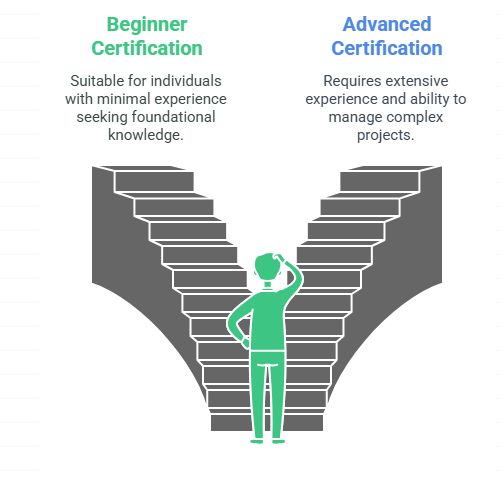
Advanced-Level vs. Beginner Certifications
Choosing a certification level depends on your career stage and eligibility:
Beginner Certifications: Programs like CAPM have straightforward requirements and focus on foundational knowledge. They cater to individuals with minimal experience, providing a solid base for future certifications.
Advanced Certifications: Programs like PMP or APMIC’s advanced certification demand extensive prerequisites, including proven experience leading projects and the ability to handle organizational complexity.
Benefits of Meeting Certification Requirements
Successfully fulfilling the requirements for project management certification can transform your career in several ways:
Career Mobility: Access leadership roles across diverse industries.
Global Recognition: Credentials like those offered by APMIC’s certification are respected worldwide.
High Earning Potential: Certified managers earn 20–25% more than their uncertified peers.
Skill Optimization: Gain expertise in project lifecycles, stakeholder alignment, and budgeting tools.
The Role of APMIC in Certification
Among the array of certifications, APMIC’s program stands out due to its unmatched comprehensiveness. The program features over 400 modules designed to prepare candidates for the most complex projects.
Eligibility Support: Offers training that fulfills educational and work experience requirements.
Cutting-Edge Tools: Covers software like Jira, Microsoft Project, and other industry tools.
Global Accreditation: Aligned with international frameworks to ensure universal applicability.
How to Prepare for Certification Requirements
If you’re unsure how to meet the stringent requirements for project management certification, here’s a roadmap:
Self-Assessment: Understand your starting point—evaluate your experience, skills, and goals.
Training Programs: Enroll in preparatory courses like those offered by APMIC, which simplify the eligibility process.
Develop Soft Skills: Engage in activities that build communication, problem-solving, and collaboration abilities.
Gather Documentation: Maintain evidence of previously handled projects and educational achievements.
Mock Tests and Revision: Familiarize yourself with examination patterns through practice tests or simulations.
Less Commonly Known Facts About Project Management Certification
The Growing Demand for Project Managers: By 2030, the global economy will need 25 million new project professionals, highlighting the importance of certifications in meeting this demand.
The Role of AI in Project Management: AI is increasingly being used to support project management tasks, making certifications that include AI skills highly valuable[Source: Harvard Business Review].
The Importance of Sustainability in Project Management: Modern certifications often emphasize sustainability and environmental responsibility, reflecting the shift towards green projects[Source: Project Management Journal].
The Impact of Agile Methodologies: Agile certifications are gaining popularity as more organizations adopt agile frameworks for project management[Source: Agile Alliance].
The Rise of Hybrid Certifications: Some certifications combine traditional project management with specialized skills like IT or construction, catering to niche industries[Source: Construction Business Owner].
The Role of Emotional Intelligence in Project Management: Developing emotional intelligence is crucial for effective team leadership and stakeholder management[Source: Forbes].
The Use of Blockchain in Project Management: Blockchain technology is being explored for its potential to enhance transparency and security in project management[Source: IEEE].
The Integration of Data Analytics in Project Management: Certifications that include data analytics skills are becoming more sought after as data-driven decision-making becomes essential[Source: Data Science Council of America].
The Importance of Cultural Competence in Global Projects: Understanding cultural differences is vital for managing projects across international teams[Source: Harvard Business Review].
Conclusion
In conclusion, understanding and addressing the requirements for project management certification is a vital step toward professional growth. With the right tools, preparation, and certification provider, you can unlock new career possibilities. If you're looking to enhance your project management skills and prepare for certifications like PMP, consider enrolling in a comprehensive prep course. For instance, APMIC offers a robust PMP certification prep course that covers all the necessary modules to ensure you're well-prepared for certification while bridging gaps in prerequisites. Take charge of your future by building a foundation that fosters lifelong success in project management. Visit APMIC to explore the best PMP certification prep courses available.
FAQs
What are the basic requirements for project management certification?
Basic requirements include a high school diploma or bachelor’s degree, project management experience, and completion of educational hours from a certified provider like APMIC.
Do all certifications require work experience?
No. Foundational certifications like CAPM don’t require prior experience, making them accessible to beginners
Can I meet requirements for project management certification online?
Yes. Online courses, like those from APMIC, allow you to conveniently meet educational prerequisites and training demands.
What’s the typical time required to fulfill these requirements?
The timeline depends on the certification. For example, PMP preparation can take 3–6 months of focused study and training.
Are soft skills mandatory for certification?
Not explicitly, but they are key to excelling in leadership roles. Certifications test technical skills, but successful project management also depends heavily on communication and teamwork.
Is financial aid available for certification preparation?
Yes, many providers, including APMIC, offer financial assistance or payment plans.
How do I choose the right certification for my career stage?
Consider your experience and goals. For beginners, CAPM is a good starting point, while PMP is suitable for experienced professionals.
What are the benefits of getting certified by a globally recognized organization?
It enhances your credibility, opens up international opportunities, and increases earning potential.



